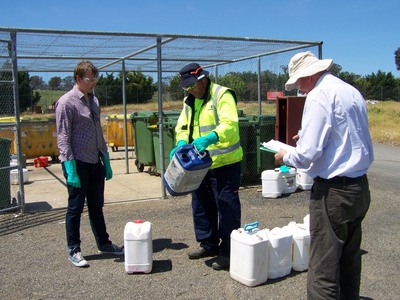Yass training day for drumMuster inspectors
drumMuster’s program coordinator Nick Arnott-Job along with communications officer Chris Davis put on the rubber gloves and protective specs to see what thousands of inspectors across Australia do on a daily basis.
They were joined by transfer operator Michael Hawkins for a five-hour lesson in drum inspecting which included drumMuster’s history, identifying product label warnings, managing risks, how to properly inspect an empty container and rejecting drums not suitable for the program.

Hawkins, who once worked in real estate but traded his suit for overalls to get his hands dirty in the waste industry, said the most important lesson was learning what happens to the drums.
“I think the most valuable part of the course was knowing the end journey, knowing that these drums get made into new things again,” he said.
“I think it’s definitely something you can tell the customers when they come in. It’s interesting and they probably don’t know what happens to them.”
Southern NSW drumMuster consultant and trainer Vernon Keighley said the class ended with some role-play and a practical lesson in how to take in eligible containers.
Vernon said containers must be clean and dry before being dropped off at one of the 760 drumMuster compounds across the country.
“As most farmers know, containers need to be clean,” he said. “If inspectors are presented with a container with chemicals inside it can pose a serious risk to them.
“It also helps with the recycling process. If a drum with chemical goes through a bailer it can cause serious injury to people operating the machinery. It could also damage the machine.”
Vernon said pressure or triple rinsing drums is the most effective way to clean out chemicals. Plastic drums should be air dried before being collected while metal drums should be pierced to allow airflow.
He said he was pleased with everyone’s enthusiasm and commitment to learning how to properly inspect a drumMuster container.
“Everyone passed with flying colours,” he said. “They also received an inspector badge, a hat and protective gloves to carry out their duties as fully fledged inspectors.”
Yass farmers and chemical users can drop off their containers between 9.30 am-3 pm weekdays and 12.45-4 pm on weekends.
For further information on the program, visit the website.
Alcoa fined $400,000 after caustic spill burns workers
In WA, an uncontrolled release of caustic solution that burned workers at Alcoa's Kwinana...
Top tips to improve hazardous materials handling
Hazardous materials handling is a crucial issue for many businesses, given they are responsible...
Illegal engineered stone seized after nationwide ban
The Victorian construction industry has been put on notice as WorkSafe's Silica Field Team...










